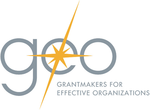Pre-Conference Session: Evaluation in Philanthropy: Five Approaches to Effective Learning
Session description
A pioneering group of grantmakers is redefining the role of evaluation in philanthropy — it’s not solely about tracking the results and the impact of past philanthropic investments. It is also about learning how to do a better job of achieving our goals moving forward. In this hands-on workshop offered by GEO, participants will explore five key approaches to learning that many grantmakers are adopting in order to effectively improve programs and results, and learn practical tools for how they can build these approaches into their own work. Advanced registration is required. Please note: This session is good for people who are new to evaluation and learning.
